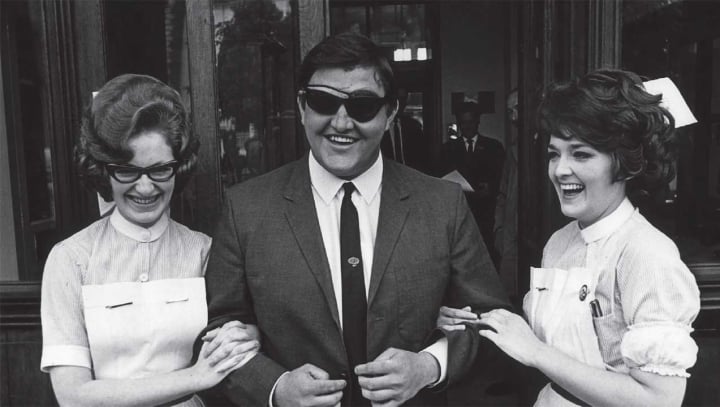A play is to be held at the Trent Bridge Inn dramatising the tragic decline of former Northants & England cricketer Colin Milburn, who died at the tender age of 48 following a battle with depression.
The show, called ‘When the Eye Has Gone’, will be shown at the Trent Bridge Inn on Wednesday, 23 November, at 7.30pm.
The purpose of ‘When the Eye Has Gone’ is to help current players appreciate the importance of planning for life after cricket.
It was written by ex-Kent and Derbyshire all-rounder, James Graham-Brown, and produced in association with Live Wire Theatre and the Professional Cricketers’ Association.
Milburn made 13,262 runs in first-class cricket for an average of 33.07; he took 99 wickets at 32.03 and made 224 catches. In nine Tests he made 654 runs at an average of 46.71.
Well-established as a Northants legend, he holds the record for catches in a season having taken 43 in 1964.
His glistening career was cut short when he lost his eye in 1969, aged 27, in a car accident.
Milburn, from then on, was unprepared for life outside of the sport and, tragically, turned to alcohol as a form of escapism – the addiction that proved his downfall 19 years later, as he died in a pub car park of a heart attack.
Tickets are priced at £10 for adults and £8 for concessions.
Click here to secure your seats…
When The Eye Has Gone is set in the bar of The North Briton pub in Newton Aycliffe, County Durham, during Milburn’s cabaret performance as 'Jolly Ollie', the character he developed that concealed his insecurities and suffering. With songs, anecdotes and a large gin and coke, the story swings backwards and forwards through Milburn’s life as he raises a glass to his triumphs and setbacks. The date is 28 February 1990, the day of his death.
The extraordinary story of Colin Milburn belongs to a passing cricket generation and will surely never be repeated. He was a man with colossal talent and build, weighing 18-stone at his batting peak. Yet in 1966 he forced his way into the England side for the first of his nine Tests, an almost unimaginable scenario in the present era of intense physiology and fitness monitoring.
Milburn’s selection against the fearsome pace of the legendary West Indies fast bowlers Wes Hall proved a masterstroke as with a combination of great bravery and skill he struck a blistering 94 in his First Test at Old Trafford followed by a glorious hundred at Lords only to be dropped for the last Test of the series because of his immobility in the field.
All too briefly he became a household name, and he even caused a sensation playing for Western Australia in the Sheffield Shield one winter, smashing 243 against Queensland at Brisbane on the first day before his dismissal just after tea. He was called up for the England tour of Pakistan and made 139 at Karachi in a Test cut short by crowd riots.
The following May, in 1969, Milburn lost his left eye in a car crash in Northampton, an injury that effectively ended his career and life prospects. He returned to Durham, and his boozy decline ended with his death from a heart attack at the age of 48. He was buried in Burnopfield where he first caught the eye as a boy prodigy on the local cricket field. Ian Botham was one of the pall bearers.
The play When The Eye Has Gone was written by the award winning playwright Dougie Blaxland, nom de plume of James Graham-Brown, a former Derbyshire and Kent all-rounder. The production is a collaboration between the Professional Cricketers’ Association, Roughhouse Theatre and Live Wire Theatre.
Tickets are priced at £10 for adults and £8 for concessions.
Click here to secure your seats…
